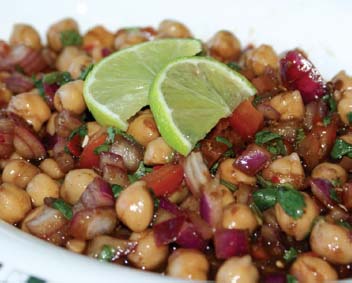
Traditionally, this dish uses cubed leg of lamb, marinated in spices and yogurt that tenderize and flavor the meat. It is then skewered and cooked over hot coals (or in the tandoor), creating lovely crispy pieces on the outside of the meat while the inside is deliciously moist and tender. You can achieve similar results on a barbecue, or failing that, a really hot oven or grill will be fine.
▪ Cut the lamb into 1-inch (2.5 cm) chunks, place in a deep bowl and sprinkle on all the remaining ingredients except the yogurt, oil and salt.
▪ Stir and turn the meat pieces until evenly coated with herbs and spices. Add the yogurt and oil and mix well. Cover and marinate the meat overnight in the fridge.
▪ If you are using the oven, preheat it to 450°F (230°C). You may also consider using the barbecue or grill. Remove the meat from the fridge about 30 minutes before cooking.
▪ Sprinkle the salt onto the meat and mix well. Thread the meat onto metal skewers (or presoaked wooden skewers), keeping the meat pieces about 1/2 inch (1 cm) apart. Reserve the marinade.
▪ Cook the lamb in the oven for about 20–25 minutes, or on the barbecue or under the grill for about 15 minutes, turning once and brushing with the marinade halfway through cooking.
▪ Serve with a crisp green salad and Yogurt Mint Sauce (page 40).
This can be served as a hearty appetizer, a tasty snack with drinks or a light lunch. The fresh-tasting Kashmiri Chat incorporates sweet, hot and sour flavors and goes particularly well with these spicy samosas.
▪ To make the pastry dough, sift the flour and salt into a bowl. Make a well in the center of the flour and add the oil.
▪ Add the water, a little at a time starting at the center to incorporate the oil, and mix, bringing the flour together until you have a soft, pliable dough.
▪ Knead gently for a minute or two. Cover and leave to rest for about 10 minutes.
▪ Divide the mixture into 6 portions. Take one portion and roll between floured hands to make a ball. Flatten slightly and roll into a circle about 8 inches (20 cm) in diameter.
▪ Cut each circle in half, and then taking the two corners of one half, bring the cut sides together, slightly overlapping, to make a hollow cone. Seal by pressing the cut sides together. You may need to dampen the edges with a little water.
▪ Fill about three-quarters full with the Karahi Keema mixture, being careful not to overfill. Pinch the open ends together firmly to close. Set aside and repeat with remaining dough.
▪ Deep-fry in batches and drain on a wire rack. Keep warm in a low oven while cooking the remaining samosas.
TIP
Make the chat the day before and allow the flavors to develop.
These lamb cutlets are so succulent and tasty you will have everyone coming back for more. The cutlets come from the rib and contain the tender fillet attached to the rib bone which makes them ideal as a finger food for informal gatherings.
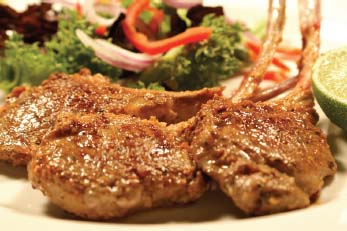
▪ Trim the cutlets and scrape the bone ends to remove fat and gristle.
▪ Mix all the remaining ingredients except the salt in a bowl, and add the lamb cutlets. Using your hands, rub the herb-and-spice mixture onto the meat ensuring each cutlet is evenly coated. Cover and leave to marinate in the fridge for at least 2 hours or overnight.
▪ Remove the lamb from the fridge about half an hour before cooking.
▪ Heat a heavy-based frying pan, capable of holding the cutlets without overcrowding, until very hot.
▪ Sprinkle some salt onto each cutlet. Cook the cutlets for about 11/2 minutes each side.
▪ Serve hot with Yogurt Mint Sauce.
5 fl oz (150 mL) plain yogurt
1 tsp mint sauce
1/2 level tsp salt
1/4 tsp chili powder
1/4 tsp garam masala
1/4 tsp green mango powder
1/2 tsp finely granulated sugar
2 tsp chopped fresh mint (optional)
Place all the ingredients in a bowl and mix well.
TIPS
The mint jelly is the secret ingredient in this dish. The hint of sweetness balances the lemon juice and spices beautifully.
Ready-prepared garlic, usually preserved in lemon juice, is also a good shortcut for marinades requiring lots of garlic.
This is an unusual but absolutely delicious dish of precooked, tender lamb cutlets, wrapped in a golden, crispy batter.
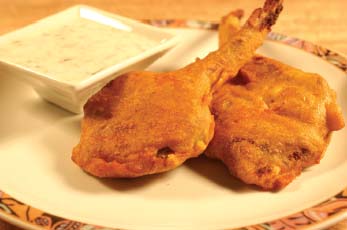
▪ Trim the cutlets and scrape the bone end of each cutlet. Place the milk, garam masala, cloves, cardamoms, ginger and onion in a pan large enough to hold the cutlets in a single layer, and bring to a boil.
▪ Add the cutlets, bring the milk back to a boil, turn down the heat and simmer gently for about 20 minutes, turning once or twice, until the cutlets are tender and all the liquid has evaporated.
▪ Sprinkle the cutlets with a little salt on each side, remove from the pan and cool.
▪ Cutlets can be prepared to this stage up to 24 hours ahead.
▪ Combine the chickpea flour, rice flour, chili powder, paprika, salt, turmeric and fenugreek leaves (if you are using them) in a bowl. Add enough water to make a thickish batter. Allow to stand for at least 10 minutes.
▪ Dip the lamb cutlets in the batter, shaking off the excess, and fry in hot oil until crisp and golden.
▪ Drain on paper towels and serve with spicy Peach Chutney (page 172) or Yogurt Mint Sauce (page 40).
TIP
The rice flour helps to make the batter crispier but it is not essential. Use extra chickpea flour if you don’t have it.
Made with lean minced chicken and fresh herbs, these tasty kebabs make a nice change from the traditional lamb seekh kebabs.
▪ Preheat the oven to its maximum temperature, or turn on the grill to heat. Place all the ingredients into a large bowl, and using your hands mix thoroughly.
▪ Divide the mixture into 8 equal parts, and using oiled hands form into sausage shapes about 4 inches (10 cm) in length.
▪ Place these on a rack in a shallow baking tray and cook near the top of the oven for 10–12 minutes, or under a very hot grill for 8–10 minutes, turning once.
▪ Serve sizzling with a green salad, Yogurt Mint Sauce (page 40) and a wedge of lemon.
• Heat a sizzle plate on a gas flame for about 5 minutes until very hot.
• Turn down the heat and place some sliced onion onto the dish.
• Immediately place the cooked food on top of the onion.
• Drizzle a little oil onto the side of the dish and tilt it slightly so the oil runs across the dish. It will start sizzling.
• Now move some of the food aside and drizzle some lemon juice onto the onions. This produces even more sizzling and a delicious aroma.
• Finally, sprinkle with chopped cilantro, and serve.
TIP
Place the first five ingredients, roughly chopped, into the bowl of a small food processor and process for a few seconds until finely chopped. Combine with the remaining ingredients and proceed as above.
Chicken tikka with fresh green (hariyali) herbs appears to be a Bengali dish, although the Punjabis also claim it as their own. Beautifully spiced, aromatic with fresh herbs, it will stimulate your tastebuds and your appetite. It’s easy to prepare and very tasty.
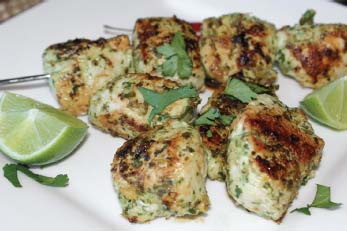
▪ Rinse the chicken fillets, pat dry with paper towels, and cut into 11/2-inch (4 cm) chunks. Sprinkle the lemon or lime juice and salt onto the chicken, stir well and set aside.
▪ Place the herbs, chilies, ginger, garlic, garam masala, yogurt and oil into a blender or food processor and process to a coarse paste.
▪ Add the herb paste to the chicken, mix well and refrigerate for 2–3 hours or overnight to marinate.
▪ Remove the chicken from the fridge at least half an hour before cooking and insert onto metal or presoaked wooden skewers.
▪ Heat the grill or barbecue and cook the chicken skewers for 12–15 minutes, basting once or twice with a little oil and turning frequently until cooked through.
▪ Serve hot with Mango Chutney (page 171) and lemon wedges.
TIP
You can brown the chicken pieces in a very hot frying pan, then, using kitchen tongs, skewer them and bake in a hot oven at 425°F (220°C) for 15 minutes.
The dosai, or dosa as it is commonly known in the West, originates from south India although it is popular all over the country. Dosai are made from a batter of soaked, ground and fermented rice and urad dhal, which is poured onto a tava (cast-iron griddle) and fried in oil or ghee, rather like a pancake or crepe. Traditionally dosai are served with a variety of chutneys and eaten for breakfast. In the West it is more usual to eat dosai stuffed with spicy potato or meat fillings, more commonly referred to as masala dosai.
Making the dosai batter at home is a lengthy and laborious process. The quick and convenient way is to buy the ready-prepared mix, which is very good and available from Indian grocers. Simply add the filling of your choice. Making dosai takes a little practice, so be prepared to throw the first couple away. Starting with a warm rather than hot pan makes it easier, and practice makes perfect.
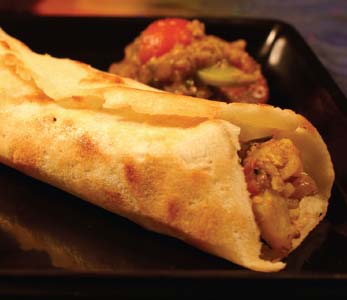
▪ Heat the oil in a medium saucepan. When hot, throw in the mustard seeds, shake the pan for 2 or 3 seconds until they pop and quickly add the onions followed by the curry leaves.
▪ Cook on medium to high heat until the onions are translucent and add the garlic, ginger and chilies. Stir-fry for a minute or two.
▪ Add the salt and turmeric, stir and add in the chicken. Continue stirring on medium to high heat until the chicken begins to color.
▪ Add 4 tablespoons of water, cover the pan, turn down the heat and cook for 10 minutes, stirring occasionally.
▪ Remove the lid and cook on low heat for another 5 minutes until the mixture is dry and the chicken cooked.
▪ Stir in the garam masala and cilantro.
▪ For dosai, follow instructions on the packet to make the batter and allow to stand for 5 minutes. Set the oven to warm.
▪ Warm a frying pan that is about 20–25cm (8–10 inches) in diameter and generously brush or spray with oil.
▪ Pour a little batter into the pan and, using a circular motion, spread it around with the back of a spoon.
▪ Cook on medium heat and, while the dosai cooks, sprinkle or spray some more oil onto the top and around the edges so that it seeps under the dosai. It will take around 4 minutes to cook.
▪ When the edges start to brown, carefully lift the dosai onto an ovenproof platter. Place some filling along the center of the dosa, and fold over one side and then the other. Hold down for a few seconds to set the dosai in shape.
▪ Place in the oven to keep warm while making more dosai.
▪ Serve warm with Coconut and Mint Chutney (page 173) and Sambhar.
1/2 tsp fenugreek seeds
1/2 tsp coriander seeds
1/2 tsp cumin seeds
1/2 tsp black peppercorns
6 dried red chilies
3 tsp tamarind paste
7 fl oz (200 mL) warm water
7 oz (200 g) red lentils
7 oz (200 g) chopped mixed vegetables
1/2 tsp turmeric
18 fl oz (500 mL) cold water
1 tbsp oil
1/2 tsp black mustard seeds
8 curry leaves
1 medium onion, chopped
pinch asafetida (optional)
1 ripe tomato, chopped
2 tsp salt (or to taste)
2 tbsp chopped cilantro
In a small pan dry-roast the fenugreek, coriander, cumin, peppercorns and chilies until aromatic. Remove from the pan, cool and grind to a powder.
Dissolve the tamarind in about 7 fl oz (200 mL) of warm water. Set aside.
Meanwhile, wash and drain the lentils and combine with the vegetables, turmeric and 18 fl oz (500 mL) of water. Bring to a boil, skim the froth off the top and simmer for 30 minutes, stirring now and then.
In a separate pan, heat the oil and add the mustard seeds and curry leaves. Cook for a minute and stir in the onion (and asafetida, if you are using it).
Stir-fry the onion until it starts to color and add the tamarind water. Bring to a boil and simmer for 5 minutes.
Add the onion mixture to the dhal (pulses) and vegetables with the tomato, salt and roasted spice mix. Bring back to a boil and simmer for another 5 minutes.
Stir in the cilantro and serve with dosai.
TIP
Have two pans going at the same time, so that you have a cooler one for starting each dosai. Take your time spreading the batter and don’t worry if your dosai has large holes or spaces in it. The edges of these holes will get nice and crisp and make it taste even better.
Succulent, creamy chunks of fish wrapped in spicy, crisp, golden batter; equally at home as a snack with ketchup or as an elegant appetizer with baby salad leaves, sweet chili sauce and a wedge of lime.
▪ Sift the chickpea flour, rice flour and salt into a large bowl. Add enough water to make into a thick batter.
▪ Stir in the salt, chili and chili powder, mint sauce, garam masala and fenugreek leaves, if you are using them. Allow the batter to stand while preparing the fish.
▪ Rinse the fish, pat dry with paper towels, and cut into large chunks about 2 inches (5 cm) in size.
▪ Stir the cilantro into the batter, followed by the fish pieces. Stir the fish around in the batter until each piece is well coated.
▪ Shake off excess batter, and deep-fry the fish pieces in hot oil for 3–4 minutes until the coating is a rich golden brown and the fish is cooked through.
▪ Serve hot.
TIPS
Use any leftover batter to make vegetable pakora. Simply dip bite-sized pieces of cauliflower, potato, mushroom or eggplant into the batter and deep-fry until crisp. Or stir in some sliced onion or spinach, and drop spoonfuls into hot oil.
If you have some fresh fenugreek, stir it into the batter with the spices; it is wonderful in this dish.
Jumbo shrimp are fished from various warm waters around the world and are available precooked, and “green” (raw) if you are fortunate enough to live close to fish markets. If buying frozen shrimp, allow plenty of time for defrosting. The best way of defrosting them is slowly in the fridge.
This is an impressive dish that is bursting with flavor. It is delicately yet distinctly spiced with the unique flavor of carom seeds (or ajowan seeds) and the tangy sweetness of the orange.

▪ If using fresh shrimp, shell and devein them, leaving the tail intact. Rinse under cold water, drain and pat dry with paper towels.
▪ Mix all the remaining ingredients, except for the salt and the sliced orange, in a noncorrosive bowl and add the shrimp. Stir to coat and leave to marinate for 15 minutes.
▪ Heat a heavy-based frying pan large enough to take the shrimp in a single layer. Stir the salt into the shrimp, cook them over medium heat for about 5 minutes, turning once or twice.
▪ Meanwhile, chargrill the orange slices on a griddle pan, a minute each side.
▪ Serve the shrimp, sizzling if you like (see page 42), with a green salad, the chargrilled orange slices and Cilantro and Mint Drizzle.
Take a handful of fresh cilantro and mint, one or two green chilies, juice of a lemon, 1 teaspoon of finely granulated sugar, and salt and pepper to taste, and place in a blender. Blend until smooth.
Spinach Bhaji, or palak pakorah as it is referred to in India, is just one of the many types of spicy snacks made with chickpea (besan) flour. It is quick, easy and tasty and in fact quite nutritious. A good appetizer or snack for vegetarians and nonvegetarians alike.

▪ Place all the ingredients except the spinach in a bowl and add enough water to make a thick batter. Cover and leave to stand while preparing the spinach.
▪ Wash the spinach leaves in plenty of water, squeeze out excess water and shred the leaves finely. Add to the batter and stir well.
▪ Deep-fry tablespoons of the mixture in hot oil. Do not overcrowd the pan. Press the bhaji lightly while it is frying to squeeze the uncooked mixture to the outside and ensure thorough cooking.
▪ Drain on paper towels and serve hot with sauce or chutney of choice.
TIP
Use frozen, thawed spinach for added convenience.
The ubiquitous samosa is a popular snack throughout India and famous around the world. A delightful crisp, deep-fried triangle with a delicious spicy filling, it is versatile enough for a quick snack on the run or as part of a prestigious banquet.
The carrots used in this recipe give the filling added flavor and texture, but you can omit them and make up the quantity with more potato.
▪ Make the filling first. Boil the carrot in salted water for 5 minutes and add the potato. Cook until the vegetables are tender but not breaking apart. Drain.
▪ Meanwhile, heat the oil in a heavy-based saucepan and add the onion. Fry for a few minutes over medium heat until the onion is beginning to color around the edges.
▪ Add the ginger, chilies, turmeric, cumin and salt and stir-fry for 2 minutes. Stir in the cooked vegetables, peas, green mango powder and garam masala. Mix well over low heat for a few minutes so that the vegetables absorb the spices.
▪ Turn off the heat and allow the filling to cool while making the pastry.
▪ To make the pastry dough, sift the flour and salt into a bowl. Make a well in the center of the flour and add the oil. Add about 4 fl oz (120 mL) of water, a little at a time starting at the center to incorporate the oil, and mix, bringing the flour together until you have a soft, pliable dough. Knead gently for a minute or two until smooth.
▪ Cover and leave to rest for about 10 minutes.
▪ With floured hands, divide the mixture into 6 portions. Take one portion and roll between floured hands to make a ball. Flatten slightly and roll into a thin circle about 8 inches (20 cm) in diameter.
▪ Cut each circle in half and, taking the two corners of one half, bring the cut sides together, slightly overlapping, to make a hollow cone. Seal by pressing the cut sides together. You may need to dampen the edges with a little water.
▪ Fill about three-quarters full with the potato mixture, being careful not to overfill. Pinch the open ends together firmly to enclose the filling. Set aside and repeat with the remaining dough.
▪ Deep-fry in batches and drain on a wire rack. Keep warm in a low oven while cooking the remaining samosas.
▪ Serve piping hot with Tamarind Sauce, Kashmiri Chat (page 39) or ketchup.
2 tsp tamarind paste
7 fl oz (200 mL) warm water
1/2 tsp salt
1/2 tsp chili powder
1/2 tsp garam masala
1/2 tsp green mango powder
1 tbsp ketchup
1 carrot, grated
1 tbsp diced red onion
1 tbsp chopped cilantro
Dissolve the tamarind paste in the water.
Add the remaining ingredients and mix to combine.
This is a delicious and quite substantial dish with a lovely combination of textures and flavors: crispy pancake, moist filling, a fresh-tasting chutney and an earthy, tangy Sambhar (page 45). For some tips on making the dosai, see the Chicken Dosai recipe (page 44).
▪ Heat the oil in a heavy-based pan and add the mustard seeds. Shake the pan over the heat for a couple of seconds until the seeds pop and immediately add the onion and curry leaves.
▪ Cook, stirring over medium to high heat, until the onion is translucent, about 5 minutes. Add the chilies, cumin, coriander, turmeric and salt. Stir for a few seconds until aromatic and add the potato.
▪ Stir-fry the potato in the oil-and-spice mix for 3–4 minutes and add 3 tablespoons of water. Stir again, cover and allow to cook over low heat for about 10–15 minutes until the potato pieces are tender.
▪ For the dosai, follow instructions on the packet to make the batter and allow to stand for 5 minutes. Set the oven to warm.
▪ Gently warm a frying pan about 8–10 inches (20–25 cm) in diameter and generously brush or spray with oil. Pour a little batter into the pan and, using a circular motion, spread it around with the back of a spoon.
▪ Cook on medium heat for about 4 minutes. While the dosai cooks, sprinkle or spray some oil onto the top and around the edges so that it seeps under the dosai.
▪ When the edges start to brown, carefully lift the dosai onto an ovenproof plate. Place some filling along the center of the dosai, and fold over one side and then the other. Hold down for a few seconds and it will hold its shape.
▪ Keep warm while making more dosai. Serve warm with Coconut and Mint Chutney (page 173) and Sambhar (page 45).
TIP
Have two pans going at the same time, so that you have a cool one for starting each dosai.
Paneer or curd is used for a variety of Indian dishes both sweet and savory, particularly in northern India. It is rich in protein, making it a good substitute for meat in vegetarian meals. This dish is a tasty and colorful appetizer.
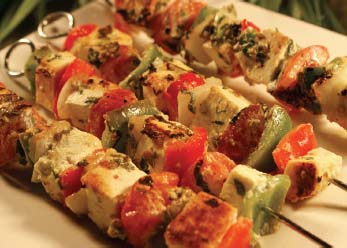
▪ Cut the paneer into even-sized chunks about 1 x 1 inch (2.5 x 2.5 cm). Cut the peppers into squares and the onion and tomatoes into large chunks, about the same size as the paneer.
▪ Thread the paneer and vegetables onto 8 skewers (presoaked if you are using wooden ones), dividing the ingredients equally. Place in a shallow, nonmetallic dish that will hold the skewers in a single layer.
▪ Place all the remaining ingredients and half the oil into a bowl and mix until combined. Pour the marinade over the skewers, turning each skewer until the paneer and vegetables are well coated with the marinade. Cover and refrigerate for 2 or 3 hours.
▪ Remove the skewers from the fridge about half an hour before cooking and heat the grill or barbecue. Brush or spray the skewered ingredients with oil, and grill or barbecue on all sides for 3–4 minutes until the paneer and vegetables are charred around the edges.
▪ Serve hot with a spicy salad and naan or chapati.
Although the filling is a little different, Indian spring rolls are similar to Chinese spring rolls in appearance, texture and taste, only much spicier. This is quite an easy recipe that is even easier if you use ready-made spring-roll pastry available from Asian grocers and supermarkets.
▪ Heat the oil in a karahi or saucepan and add the garlic and ginger. Stir-fry for a minute or two and add all the remaining ingredients for the filling except for the paneer and soy sauce, and mix well.
▪ Continue to stir-fry on medium heat for 5–6 minutes until the vegetables are tender crisp. Add a little water if required to prevent them from burning. Turn off the heat and stir in the paneer and soy sauce. Allow the vegetables to cool while making the pastry.
▪ Sift the flour and cornstarch into a medium bowl; add the beaten egg and enough water to make a thickish batter. Do not overmix.
▪ Heat a pancake pan, or nonstick frying pan, and brush or spray with a little oil. Pour in about 2 tablespoons of batter and spread thinly over the pan to make a thin pancake. Turn when the underside is lightly brown and brown the other side. Repeat with the remaining batter.
▪ Place a pancake on a flat surface in front of you. Put about a tablespoon of vegetable filling onto the half nearest to you, about 1 inch (2.5 cm) from the edge. Fold this edge over the filling, fold over once more, then bring in the sides. Continue to roll tightly until you have a neat roll. Secure with a toothpick if necessary.
▪ Repeat with the remaining filling and pancakes.
▪ Deep-fry the rolls in hot oil until crisp and golden. Drain and serve with a sauce of your choice. Tamarind Sauce (page 50) or the Cilantro and Mint Drizzle (page 47) is delicious with these rolls.
A delicious snack any time of the day, Aloo Ki Tikki is a popular vegetarian appetizer in Indian restaurants. It is a tasty, spicy potato tikki (patty), panfried until golden and crispy. Serve it with an assortment of chutneys and sweet, sour or spicy sauces.
There are as many recipes for making these lovely little potato cakes as there are cooks. The one below is quick and easy.
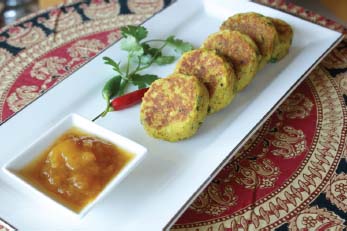
▪ Cook the potatoes in boiling salted water for about 15 minutes until tender. Drain well and return to the hot saucepan to dry off completely.
▪ Add the butter and mash the potato until smooth.
▪ Microwave or boil the peas until just cooked and add to the mashed potato with all the remaining ingredients except the oil. Mix well.
▪ Take about a tablespoon of mixture and, with oiled hands, roll first into a ball and then flatten slightly to make a patty. Repeat with the remaining potato mixture.
▪ Heat a heavy-based, nonstick frying pan and pour in enough oil to cover the base. Add the potato patties to the pan in batches and cook over low to medium heat for about 5 minutes each side until golden and crisp. Add a little more oil as required.
▪ Serve hot with Kashmiri Chat (page 39), Mango Chutney (page 171) or Tamarind Sauce (page 50).
TIP
For a lower-fat version, spray tikkies lightly with oil and bake in a hot oven at 425°F (220°C) for 20–25 minutes.
A simple example of “fusion” cooking, this warming soup is simple to prepare and delicious to eat. You can use practically any combination of vegetables that are in season.

▪ Remove husk and hairs from the corn and discard. Using a sharp knife, slice off the kernels. Peel and coarsely chop the remaining vegetables.
▪ Place all the vegetables in the bowl of a food processor and process briefly, or chop finely.
▪ Heat the oil in a large heavy-based saucepan and add the spices. Fry for a few seconds and stir in the vegetables.
▪ Stir-fry for about 2 minutes and add the lentils, water, stock cube (crumbled) and salt. Bring to a boil. Turn down the heat and skim the froth off the surface.
▪ Partly cover and simmer for about an hour, stirring once or twice. Stir in the lime juice and cilantro, and serve.